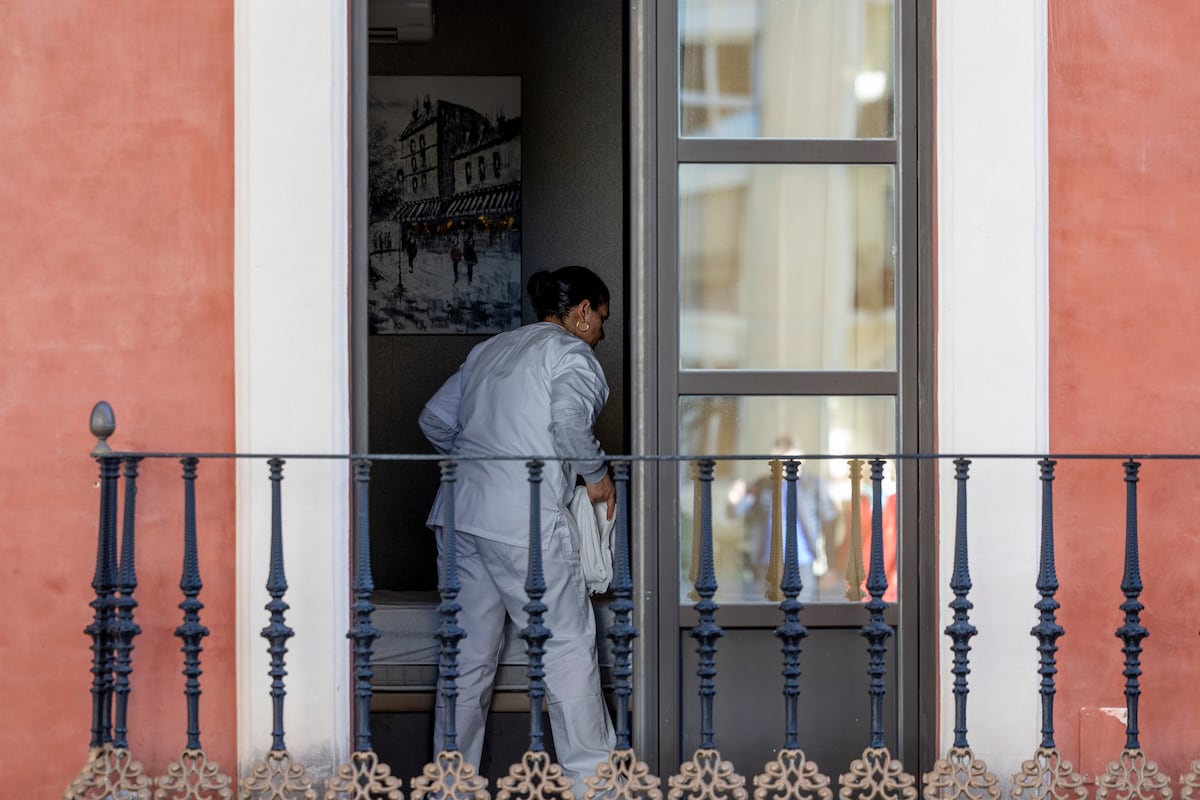The President of the Government, Pedro Sánchez, at a press conference after the meeting of the Council of Ministers, this Tuesday at the Palacio de la Moncloa.Emilio Naranjo / EFE
The Government undertakes before Brussels to carry out a profound labor reform that includes the simplification of current contracts until reducing them to three, according to the document that La Moncloa has worked on and that has sent to Congress to debate it today in a long plenary session led by Pedro Sánchez .
The text, of 200 pages, details the most important reforms and also the enormous public investments that will be developed thanks to the 72,000 million that will come from the great European recovery fund.
The document expressly speaks of three types of contracts: "one" stable "for all activities, another" temporary "for those of this nature and one" training "for insertion, in particular, in the labor market" .
Timing is important, and the document clearly states that there will be a first package of reforms in this semester that are not controversial.
Priority is given to the shock plan against youth unemployment, the modernization of active employment policies -basically training-, and the digitization of public employment services.
However, "in parallel" the others will be carried out, including the modernization of collective bargaining, the most sensitive for employers and Brussels.
In any case, the wording is ambiguous enough so that both Calviño and Díaz can accept it, and it will be in the real negotiation with employers and unions when it is seen how far La Moncloa is willing to go and especially in what terms.
What Brussels has to say about this will also matter, whose positions are closest to Calviño.
Shock plan against youth unemployment
The Executive also points out that until the end of 2021 there will be a temporary ERTE mechanism that promotes the reinstatement of workers.
And it announces "new internal flexibility instruments as alternatives to dismissal and high temporary employment, through two mechanisms for adjusting working time in the face of cyclical or extraordinary drops in demand and accompanying structural transition processes in sectors undergoing reconversion."
These will be the new structural ERTEs, which will have a new regulation with an initial fund to cover it, which can be financed with credits from the European fund.
And other reforms already underway are pointed out, with the aim of "guaranteeing decent work through adequate regulation of teleworking, digital platform distributors and subcontractors, as well as the modernization of collective bargaining mechanisms."
This last point is decisive because it was one of the key issues of the PP's labor reform.
The State will pay up to 100% of the housing renovations
The recovery plan plans to invest 20,000 million in sustainable mobility and housing rehabilitation
Sánchez promises to use the 140,000 million euros for the greater modernization of Spain since the entry into the EU
It also promises "a modernization of the
matching
systems of
supply and demand, of bonuses and active employment policies, which renews the digitization of management systems to be able to apply artificial intelligence to match supply and demand and guarantee a personalized itinerary of training, retraining and employability for workers ”.
The idea is to minimize temporality.
“This program contemplates the simplification of employment contracts, ensuring that temporary contracts respond to the nature of the work and with an adequate framework for training.
Along with this, the creation of a permanent mechanism for the training and requalification of workers in business adjustment processes, both of a temporary nature (in the face of significant drops in demand) and structural (in the face of sectoral reconversion processes that require the adaptation of the workers or transition to other types of jobs or sectors).
Based on the experience of the ERTE mechanism, applied successfully during the covid-19 crisis, it is a question of having a permanent instrument of internal adjustment of companies, an alternative to high temporary employment and unemployment, that acts as a buffer against the extreme volatility of the Spanish labor market and be oriented towards the training and requalification of workers ”, the text states.
Another of the most delicate issues, especially due to the discussion within the coalition, is the pension reform.
The document that the Government has prepared - which is not the final one that will be sent to Brussels and which will have much more detail - tiptoes over the most controversial issue, the extension of the calculation period to calculate future pensions.
However, this possibility is expressly cited, although without putting years as in the first documents that were handled in the Delegate Committee on Economic Affairs.
“The implementation of a package of complementary measures is proposed that will be elevated to social dialogue and include: the separation of sources of financing;
the implementation of a pension revaluation mechanism that guarantees the maintenance of purchasing power;
the continuation of the process of bringing the effective retirement age closer to the legal age through incentives to delay retirement and adjusting the distorting elements in the regulation of early retirement;
adaptation to the new professional career models of the calculation period for calculating the retirement pension;
the integration and convergence of the different pension regimes, such as those for the self-employed;
the revision of the complementary social security system, promoting its development in the field of companies ”, says the text.
The mention of the counting period is therefore very soft, avoiding controversy.
Also in the fiscal question it goes far above, without clear commitments, and much less detail than in the labor reform.
“It is necessary to address a reform of the tax system that allows it to make it more solid and resilient, more equitable, progressive and fair, more aligned with the reality of the 21st century, that promotes the protection of the environment and healthy habits, as well as fiscal sustainability. in the medium and long term ”, says the text.
“All of this must be accompanied by adjustments in existing taxes.
Changes aimed at increasing the efficiency and fairness of our tax system and adjustments that alleviate the impact of the pandemic.
In the same way, a tax system suitable for the 21st century must face a process of adapting environmental taxation to the best practices of our partners, within the framework of a green tax reform that contributes to achieving a more sustainable socioeconomic model, which supports measures to protect the environment, sustainable mobility and fight against climate change, and to facilitate compliance with the commitments acquired in environmental matters ", he says.
One of the keys to the plan is the huge boost to public investment that will be achieved thanks to money from the European fund.
It is a complete turnaround that Pedro Sánchez compared to the effect of Spain's entry into the EU.
The document studies the impact of this public investment on the economy and indicates that “with an investment of 2 points of GDP per year in the period of execution of the plan, it will be possible to recover levels of public investment in line with the maximums of the last cycle and close the gap with the most investing countries ”.
The plan analyzes the evolution of public investment in Spain in recent years, and recalls that “from the creation of the Economic and Monetary Union until well into the 2008 crisis, annual public investment had exceeded 4% of GDP on average , clearly above the European average.
This trend was reversed in the last decade.
While investment in Europe has remained relatively stable at 3% of GDP, in Spain it has been cut in half, standing at just 2% of GDP in recent years ”.
The plan, with almost 70,000 million of public investment, and the planned reforms will suppose, according to the Government's calculations, a potential growth above 2% of GDP.
"The medium-long-term impact of the plan may lead to an increase in the potential growth of the economy of 4 tenths," the text concludes, in addition to creating the 800,000 jobs in three years that Sánchez has been talking about for months.

/cloudfront-eu-central-1.images.arcpublishing.com/prisa/D72MLY57CZMHR34EAOBLSLUVFI.jpg)






